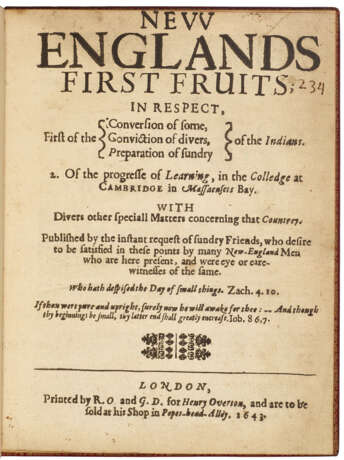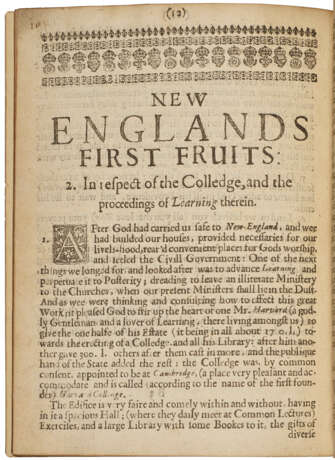ID 1236345
Лот 114 | The first printed account of Harvard
Оценочная стоимость
$ 120 000 – 180 000
First edition of the first and rarest "Eliot Tract," promoting the fledgling Boston colony and their newly begun missionary activities, as well as containing the first printed description of Harvard —Alfred T. White copy. Although the charter of the Massachusetts Bay Company explicitly cited conversion of Native Americans as a goal of the settlement, it took several decades for any organized missionary activity to develop. When English lawyer Thomas Lechford visited the fledgling colony in 1642, he complained that the Puritans had not made any effort to learn the Native language or connect with Native residents about Christianity—concerns he shared in print in his Plaine Dealing: or Newes from New-England. The present pamphlet was published in the following year as an answer to that and other accusations. It records the first "sprinklings of God's Spirit upon a few Indians" by Roxbury minister John Eliot, whose efforts would later culminate in the printing of the first complete Bible in North America, and in the Massachusset language. Opening defensively, observing the difficulty in converting their indigenous neighbors, citing "their infinite distance from Christianity," and "the difficulty of their Language to us," the author details numerous interactions that resulted in successful conversions, and offers an optimistic prediction of future success.
While First Fruits responds to claims about the colonists' lax efforts towards missionary work, it also seeks to advertise the settlement as a success on every level. Additionally, two of the editor-authors, Hugh Peter and Thomas Weld—who traveled to London to oversee the printing—had a specific interest in preempting the exiled Roger William's burgeoning settlement in Rhode Island. The tracts, beginning with this first entry, sought not only to advertise the colony's virtues to potential settlers but also, even more so, to curry the favor and support of the Committee for Foreign Plantations. To that end, the pamphlet provides a fulsome description of Harvard College, founded less than a decade prior, and its students' many intellectual accomplishments. The author, probably Henry Dunster (first president of the college), writes: "After God had carried us safe to New-England, and wee had builded our houses, provided necessaries for our liveli-hood, rear'd convenient places for Gods worship, and setled the Civill Government: one of the next things we longed for and looked after was to advance Learning." The author continues by describing Harvard's bequest of his estate and library for the establishment of a college, which was by then "very faire and comely within and without" and already had "a large Library with some books to it." Importantly, the volume details the first "Rules, and Precepts that are observed in the Colledge"; "The times and order of their Studies, unlesse experience shall cause to alter"; "the matter of the late Commencement, expressed in a Letter sent over from the Gouvenour, and diverse of the Ministers…" The publication ends with a series of potential concerns about life in Boston with explanations and answers, including "your winters are cold," "your ground is barren," and "many speak evil of the place." In response to the first query, the author notes that while the winters are not as terrible as some assert, that the "cold here is no impediment to health, but very wholesome for our bodies," while adding that the cold was not "moist and soggie," like that in England or Holland, "but bright, claere, and faire we[a]ther, that men are seldome troubled in Winter with coughes and Rheumes."
Following the appearance of First Fruits in London, at least another ten tracts, mostly written by John Eliot, would be published through 1675. "The Eliot Tracts, which have hitherto been treated by missiologists and ethnohistorians as missionary records and reports, are a collection of key documents written by Eliot and other figures describing Eliot's Indian ministry. There is no consensus on a complete list of the Eliot Tracts among scholars, but a core of eleven documents is generally accepted … The publications of the Eliot Tracts in about thirty years were not planned as a coherent series. They were published sporadically according to various necessities of Indian ministry. The overall purpose of the tracts was mainly to report on Indian ministry and to request support" (Kim).
Rare at auction, it is only recorded twice by RBH in the last 30 years, both without the errata leaf. An important early Americanum, with a prestigious provenance, it has been the family of the consignor for over a century, when it was given to the ancestor of the current owner by august collector Alfred T. White. Sabin 52758; Church 458; Streeter 621; Wing E-519. See also Do Hoon Kim, John Eliot's Puritan Ministry to New England "Indians" (2021).
Quarto (178 x 135mm). Pp. [2], 26 (without errata leaf and final blank as often). First 7 leaves foliated in manuscript ff. 234-241. 19th-century jansenist burgundy morocco by Riviere, title gilt on upper board and spine, edges gilt, gilt dentelles (upper board detached). Provenance: Alfred T. White (presentation inscription dated March 1920) - (thence to a descendent of the recipient).
| Адрес торгов |
CHRISTIE'S 8 King Street, St. James's SW1Y 6QT London Великобритания | |
|---|---|---|
| Предосмотр |
| |
| Телефон | +44 (0)20 7839 9060 | |
| Комиссия | see on Website | |
| Условия использования | Условия использования |




